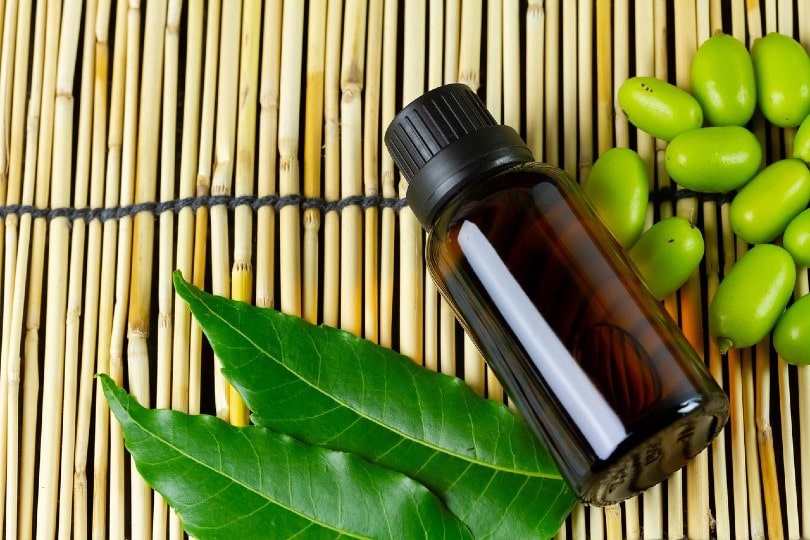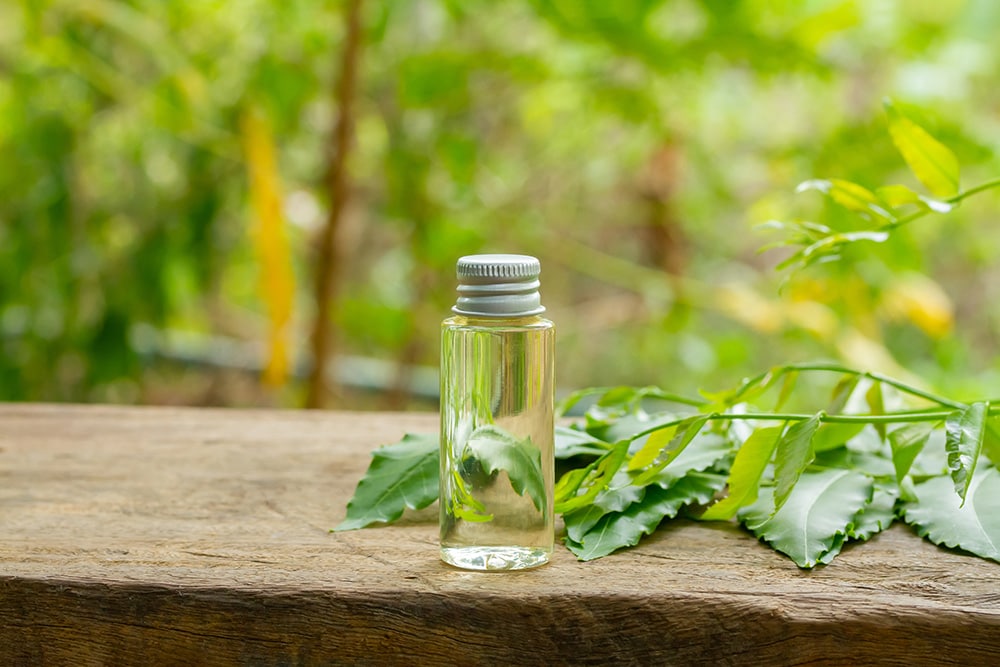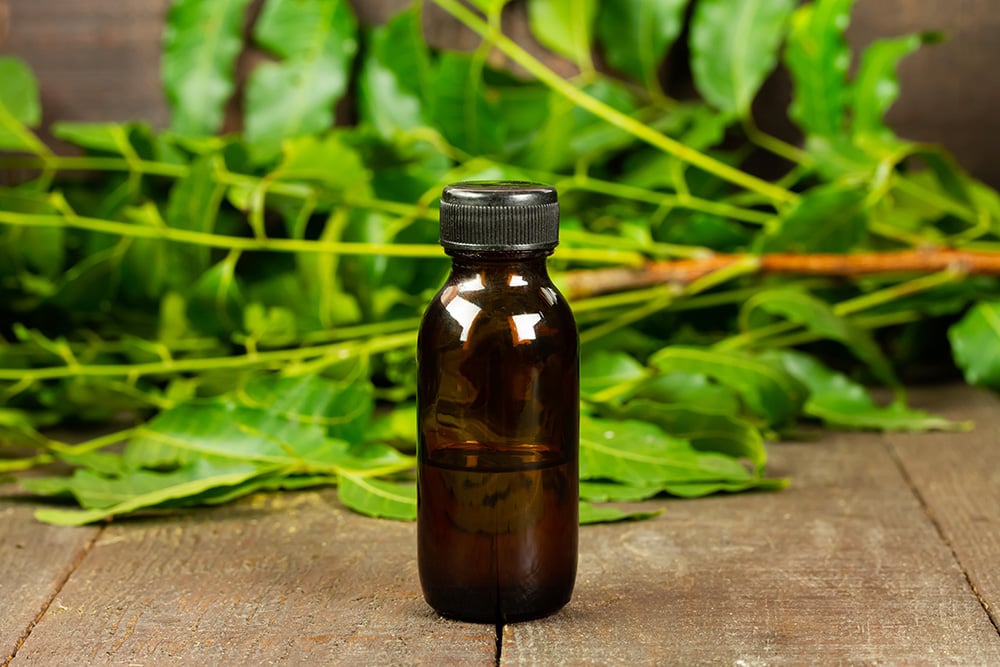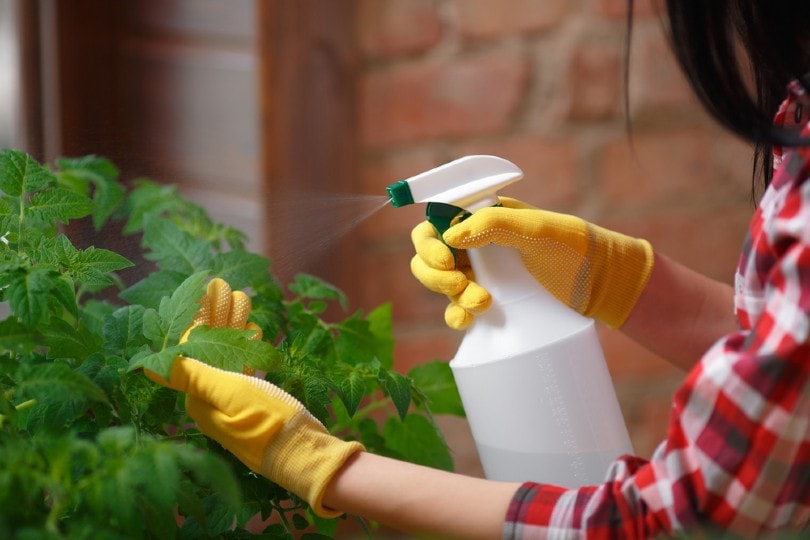How to Use Neem Oil on Plants: 5 Tips & Tricks
-
Pete Ortiz
- Last updated:

Protecting plants from pests can be challenging, a task requiring a delicate blend of effectiveness and safety. Although aggressive sprays may wipe out everyday garden hazards, they could also take down beneficial insects and possibly even your plants. Meanwhile, mild solutions might not harm your plants, but you’ll spend more time applying treatments only to see limited results.
Unsurprisingly, we can find the best solution for garden protection in plants themselves. Neem oil, a natural extract, keeps pests at bay and allows your plants to reach their fullest potential. Expert home gardeners and commercial growers rely on neem oil for effective organic maintenance during the growing season.
Of course, like any treatment, neem oil can cause more problems than it solves if you don’t use it correctly.
How to Use Neem Oil on Plants
Neem oil is a fantastic solution for controlling pests in several places, from potted houseplants and greenhouses to outdoor fruit and vegetable gardens. It can take 3–4 days to take effect, so it tends to work best as a preventative measure. However, increasing the concentration can also make it a practical and safe extermination method if you have an existing infestation.
To get the quickest results and protect your garden and greenery, follow these five tips and tricks for using neem oil on plants.

The 5 Tips & Tricks on How to Use Neem Oil on Plants
1. Mix a Neem Oil Spray
You can purchase pure neem oil for formulating a foliar spray or a pre-mixed commercial product ready for immediate use. Mixing a solution with pure neem oil is the most cost-effective option. It keeps any dangerous or useless additives out of the spray, and you get the neem oil concentration you desire.
Whether you buy a pre-mixed solution or use a homemade recipe, always reference the product’s label for proper usage. The instructions will identify the correct concentrations, the insects it will kill, and plants that you should avoid spraying.
- Blend 1–2 teaspoons of dish liquid or insecticidal soap with 1 gallon of warm water in a sprayer.
- Add 1–2 tablespoons of cold-pressed neem oil to the sprayer and mix thoroughly.
Soap is necessary to combine the oil and water, which naturally try to separate. For an added kick, consider using soaps containing essential oils known to repel insects, such as peppermint. No matter how you make your mixture, only make what you need, as neem oil becomes less effective after several hours.
2. Spray at the Right Time
Since it works on pests at all stages, you can use neem oil on plants throughout the growing season. You can also use it to control pests that overwinter and lay eggs on leaves. But while you can apply it at all times of the year, there are specific times of day when you shouldn’t spray neem oil.
Apply neem oil in the early morning or dusk when the sun isn’t out. Direct sunlight can scorch leaves when combined with a fresh foliar spray. Spraying in the evening gives the oil time to settle and dry, and you won’t disturb pollinators and other beneficial insects.

3. Spray Leaves Correctly
While it’s generally safe to use on most plants, some will burn more readily from neem oil, particularly herbs or vegetables with delicate leaves. Avoid spraying seedlings under a month old or plants stressed from drought, disease, extreme temperatures, or overwatering.
Always test your neem oil spray before using it on an entire plant. Spray one leaf, and wait 24 hours before checking for damage.
If the plant reacts positively, you can spray the rest of the plant, making sure to coat the tops and undersides of the leaves until they’re dripping. Shake the sprayer constantly as you work. The oil and water want to separate, and you must help your emulsifier pull everything together with ongoing agitation.
Misting with a spray bottle is the most convenient measure, but you can also wipe down plants with cotton balls or a microfiber cloth. Although it’s time-consuming, wiping plants will physically remove pests and provide a more thorough coating. Wear protective equipment to protect your hands from drips as you spray.
4. Reapply Neem Oil as Needed
Neem oil takes a few days to yield results, but consistent reapplications can control infestations and prevent future insect attacks. Spray once every 2–3 weeks if you don’t have a pest problem but want to create an effective barrier. A present infestation needs a more aggressive approach: generally, a spraying frequency of once a week.

5. Treat the Soil with Neem Oil
Instead of spraying plants directly, you can also pour 2–3 cups of your neem oil solution around the base of your plants. Soil soaks help eradicate soil-bound pests like nematodes and act as a longer-lasting solution because they infuse plants with neem oil. Neem oil enters the plant’s roots to become a systemic insecticide, an active agent spread throughout the entire plant.
Azadirachtin also lasts longer in soil, where its half-life can extend up to 44 days. On leaves, the half-life is only 2.5 days, hence the need for more frequent applications.
It takes about two weeks before you begin seeing results when you use a soil soak. Perform repeat applications about once every 2 weeks for infestations and once every 3 weeks as a preventative measure.
What Is Neem Oil?
Neem oil comes from the neem tree (Azadirachta indica), a broad-leafed evergreen common to India and many African countries. The plant grows rapidly and is easy to propagate, preferring the high temperature of its native regions but remaining tolerant of poor soil conditions. Along with pest control qualities, the extracted oils offer medicinal and cosmetic benefits that native cultures have enjoyed for thousands of years.
The active agent in neem oil is azadirachtin: an insecticidal, miticidal, and fungicidal compound. It is primarily an antifeedant and growth inhibitor. Larvae emerge from eggs to feed on neem oil-coated plant leaves. The azadirachtin slows feeding and development, disrupting the organism’s hormones, maturation, and reproductive functions, eventually causing death. Neem oil applications also have a secondary benefit of suffocating and repelling pests.
Like other vegetable oils, neem oil comes from split and pressed seeds. Seed remains may undergo further processing, or manufacturers may introduce solvents to extract every last bit of oil. These additives make the product less effective than pure extracts. Pure, cold-pressed neem oil retains the highest concentration of azadirachtin alongside hundreds of other beneficial compounds.
Which Insects Does Neem Oil Kill?
Neem oil is an effective control measure for a broad range of mites and insects, including:
- Mealybugs
- Aphids
- Spider mites
- Whiteflies
- Thrips
- Moths
- Scale
- Leafhoppers
- Japanese beetles
- Parasitic nematodes
It can also control fungi such as powdery mildew, rust, black spot, blight, and scab. Azadirachtin is less effective than the other compounds in neem oil when dealing with these, so you can save money by choosing clarified hydrophobic extract of neem oil instead of 100% neem oil.
Manufacturers use alcohol to separate azadirachtin from the other neem oil compounds to create a clarified hydrophobic extract of neem oil. While it won’t cure a fungus-infected plant, it can prevent spreading by blocking germination.
The clarified extract also controls bugs outside the larval stage through suffocation. The spray will coat and kill eggs and adults, which may not face imminent danger from azadirachtin since they are already fully developed.
Many insects, particularly beneficial ones, won’t see any adverse effects from neem oil. Butterflies, ladybugs, bees, and worms are generally safe. Certain pests such as ants, earwigs, and spiders are also immune to neem oil, so it’s crucial to understand the nature of your pest problem before applying a treatment.
Is Neem Oil Dangerous?
Neem oil is non-toxic when you use it correctly and won’t significantly impact anyone in the house or the environment. While it’s safe around children and pets after application, you should not spray it near anyone who might inhale any of the particles. It can be mildly irritating to the skin and eyes, and you should use protective gear whenever you spray.
Although you should never ingest neem oil or the solution containing it, it is generally food safe if you spray it on leafy vegetables. Before preparation, you should still wash off as much residue as possible.
Final Thoughts
When insects and fungi are a prevalent threat, neem oil should be one of the first treatments you choose. It’s nature’s miracle pest prevention that’s capable of killing garden nuisances while keeping your plants and beneficial critters healthy. Ideally, you won’t have to reach for neem oil or any other product to keep your plants flourishing. But when the going gets tough, follow these simple tips and tricks for using neem oil the safe and effective way.
Featured Image Credit: Ninetechno, Pixabay
Contents



